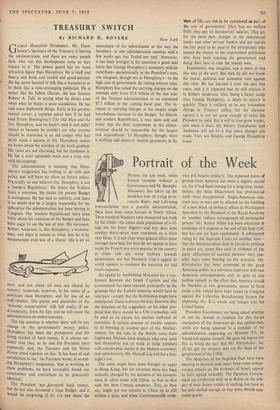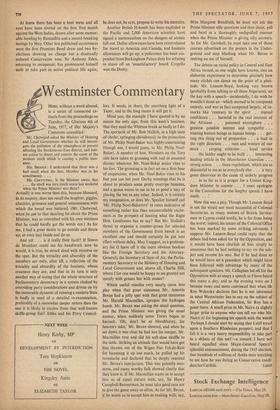Portrait of the Week
DURING the last week, while France remains without a Government and M. Bourges- Maunoury has taken up the thankless task of trying to re- concile Right- and Left-wing irreconclables into a possible administration, there have been more horrors in North Africa. Three hundred Moslems were massacred last week by the rebels—the entire male population of a vil- lage not far from Algiers—and two days later another thirty-seven were murdered on a farm near Oran. It is not clear what general effect these outrages have had, but they do not appear to have made the French any more popular in the country or either side any more inclined towards moderation; nor has President Coty's appeal to world opinion to condemn the terrorists yet had much response.
An appeal by Archbishop Makarios for a con- ference between the Greek Cypriots and the Government has been rejected, principally on the grounds that the Turkish minority would have to take parta reply that the Archbishop might have anticipated. There is always the fear, however, that the rejection of his suggestion, or his other pro- posal that there should be a UN trusteeship, will be used as an excuse for another outbreak of terrorism. A certain amount of trouble appears to be brewing in another part of the Mediter- ranean, for the cuts in the British navy have frightened Maltese dock-workers who may soon find themselves out of work in large numbers with catastrophic results to the Maltese economy; and unfortunately Mr. Mintoff is in bed for a fort- night's rest.
The same might have been thought to apply to Hong Kong, but the situation there has been radically changed by the decision of the Govern- ment to allow trade with China, as free as that with the Iron Curtain countries This, so they say, might put our exports to China up to £20 million a year, and some Commonwealth cowl- s tries will benefit similarly. The expected storm of protest from America has worn a slightly unreal air, for it had been coming for a long time; never- theless, the State Department has pronounced itself `most disappointed.' Anglo-American rela- tions may or may not be affected by the building of a new block of embassy offices in Washington described by the President of the Royal Academy as 'another tedious arrangement of rectangular prisms.' Mr. Arthur Miller has been convicted of contempt of Congress at the end of his long trial, but has not yet been condemned. A subsequent ruling by the Suprenie Court on another case— that the Administration shall be forced to produce in court any Secret files used as evidence of the party affiliations of accused persons—may pos- sibly have some bearing on the question. Mr. Khrushchev has been presented to the great American public in a television interview with two American correspondents and, in spite of one tactless remark to the effect that America would be Socialist in two generations, seems to have made a hit; voices have been raised in Congress against the Columbia Broadcasting System for importing Mr. K.'s words and images into the United States.
President Eisenhower, on being asked whether or not he intends to retaliate for this Soviet 'usurpation of the American air, has replied that, while not being opposed to a member of his administration appearing on Moscow TV, he would not appear himself. He gave the reason for this as being the fact that Mr. Khrushchev, for all his gift for oratory, was not the head of the government of the USSR. The Ministers of the Baghdad Pact have been meeting in Karachi and, apart from some embar- rassing attacks on the existence of Israel, appear to have agreed amicably. The Egyptian Govern- ment are conferring with us in Rome on the sub- ject of their frozen credits in sterling, but have so far only melted enough to buy some British con- sumer goods. At home there has been a heat wave and all eyes have been riveted on the first Test match against the West Indies, drawn after some memor- able bowling by Ramadhin and a record-breaking innings by May. Other less publicised occurrences were the first Premium Bond draw and two by- elections showing no change but a drastically reduced Conservative vote. Sir Anthony Eden, returning to recuperate, has pronounced himself unfit to take part in active political life again; he does not, he says, propose to write his memoirs.
Another British H-bomb has been exploded in the Pacific and 2,000 American scientists have signed a memorandum on the dangers of atomic fall-out. Dollar allowances have been reintroduced for travel to America and Canada, and business allowances will go up; a policeman has been sus- pended from Buckingham Palace duty for refusing to shave off an 'unsatisfactory' beard. Crepello won the Derby.



































 Previous page
Previous page